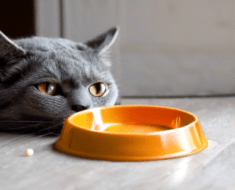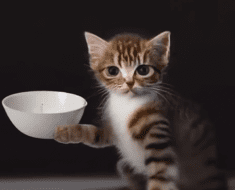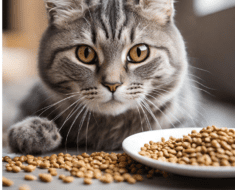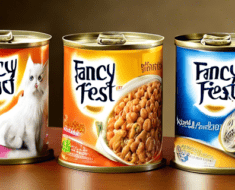Yes, diabetic cats can eat chicken. As a lean source of protein, chicken can be a suitable option for diabetic cats’ diets, helping to manage their blood sugar levels effectively while providing necessary nutrients.
Additionally, chicken is low in carbohydrates, which is beneficial for cats with diabetes. However, it’s crucial to remove the skin and bones from the chicken before serving it to your feline friend, as these can pose health risks. It’s always recommended to consult with your veterinarian before making any dietary changes for your diabetic cat to ensure it aligns with their specific needs.
By doing so, you can provide a balanced and appropriate diet for your cat’s condition.
Can Diabetic Cats Eat Chicken?
When it comes to managing a cat’s diabetes, diet plays a crucial role. As a cat owner, you may wonder if chicken can be a part of your furry friend’s diabetic-friendly diet. Understanding a diabetic cat’s diet is essential before incorporating any new food. In this article, we will explore the topic in detail and answer the question: Can diabetic cats eat chicken?
Understanding A Diabetic Cat’s Diet
A diabetic cat’s diet is carefully tailored to help regulate their blood sugar levels and manage the condition effectively. The primary goal is to provide them with a well-balanced diet that is low in carbohydrates and high in protein. This helps in maintaining a consistent blood sugar level, reducing the need for insulin injections, and preventing any fluctuations that can harm their overall health.
Feeding a diabetic cat a diet that consists of high-quality protein sources is crucial. These protein sources should be low in fat and carbohydrates, promoting weight management and reducing the risk of obesity, which is often associated with feline diabetes.
Benefits Of Feeding Chicken To Diabetic Cats
Chicken is an excellent protein source for diabetic cats due to its low carbohydrate content and high nutritional value. Here are some of the benefits of incorporating chicken into their diet:
- Low in Carbohydrates: Chicken is naturally low in carbohydrates, which helps in regulating a cat’s blood sugar levels. This is crucial for diabetic cats as it helps in reducing insulin dependence and prevents sudden spikes in glucose levels.
- High in Protein: Protein is a vital component in a cat’s diet, especially for diabetic cats. Chicken provides them with the necessary amino acids, supporting their overall health and aiding in muscle maintenance.
- Lean and Nutritious: Skinless, boneless chicken breasts or thighs are lean sources of meat that offer essential nutrients without excessive fat. This helps diabetic cats maintain healthy body weight, reducing the risk of obesity-related complications.
Incorporating chicken into a diabetic cat’s diet should be done in moderation and under the guidance of a veterinarian or a veterinary nutritionist. Remember to remove any bones, skin, and excess fat before feeding chicken to your cat to avoid any digestive issues. Now that you understand the importance of a diabetic cat’s diet and the benefits of feeding them chicken, you can make informed decisions to keep your feline friend healthy and happy.
Nutritional Value Of Chicken For Diabetic Cats
When considering the nutritional needs of diabetic cats, it’s crucial to understand the value of including chicken in their diet. Chicken, being a lean source of protein, can be beneficial for diabetic cats due to its low carbohydrate content. Let’s delve into the nutritional benefits of chicken for diabetic cats.
Protein Content
Chicken is rich in high-quality protein, which is essential for the overall health of diabetic cats. Proteins aid in muscle development, repair, and maintaining a healthy weight. Including chicken in a diabetic cat’s diet can help to ensure they receive the necessary protein intake to support their bodily functions.
Low Carbohydrates
Chicken is naturally low in carbohydrates, making it a suitable option for diabetic cats. Low carbohydrate intake can help in managing stable blood sugar levels, which is crucial for diabetic cats. By incorporating chicken into their diet, diabetic cats can receive essential nutrients without the risk of spiking their blood sugar levels caused by excessive carbohydrate consumption.
Preparing Chicken For Diabetic Cats
For diabetic cats, chicken can be a great source of protein. It’s important to remove the skin and excess fat to provide a lean meal. Be sure to consult a veterinarian before introducing any new diet to your diabetic cat.
Cooking Methods
When it comes to preparing chicken for diabetic cats, it’s essential to use cooking methods that retain the natural flavors and nutrients of the meat. Grilling or baking chicken are great options as they do not require the addition of excessive oils or fats. This helps to preserve the lean protein content, making it a healthier choice for diabetic cats.
Seasoning And Additives To Avoid
When it comes to seasoning chicken for diabetic cats, it’s important to avoid certain ingredients and additives that could potentially harm their health. It’s crucial to steer clear of salt, sugar, and artificial flavorings. These can disrupt a cat’s blood sugar levels and may lead to various health complications. Instead, consider using natural herbs such as parsley, rosemary, or thyme for added flavor without the risk of negative health effects.
Incorporating Chicken Into A Diabetic Cat’s Meal Plan
Chicken can be a suitable addition to a diabetic cat’s meal plan, as it is a lean protein source. However, portion control and proper monitoring of blood sugar levels are crucial to maintaining their health.
Portion Control
Balancing Chicken With Other Foods
If you have a diabetic cat, you’ve probably wondered whether it’s safe to include chicken in their diet. The good news is that chicken can indeed be a healthy addition to a diabetic cat’s meal plan! However, there are a few important considerations to keep in mind to ensure your furry friend receives the right balance of nutrients.
Portion Control
Like with any other food, portion control is crucial when incorporating chicken into a diabetic cat’s meal plan. Cats with diabetes require a strict feeding schedule to help manage their blood sugar levels effectively. It’s recommended to divide their daily food intake into several small meals throughout the day, rather than feeding them a large meal all at once. This helps prevent spikes and drops in blood sugar. When it comes to chicken, it’s best to offer small, bite-sized portions as a treat or as part of their regular meals, without overdoing it.
Balancing Chicken With Other Foods
While chicken can be a great source of lean protein for cats, it’s important to balance it with other foods to ensure a well-rounded and nutritionally complete meal plan. A nutritious diet for a diabetic cat should include a combination of protein, carbohydrates, and fats, in addition to essential vitamins and minerals. Consider incorporating other ingredients such as high-quality cat food formulated for diabetic cats, a small amount of whole grains, and healthy fats like fish oil or flaxseed oil. Ensure that any dietary changes are made in consultation with your veterinarian to meet your cat’s specific nutritional needs. In conclusion, incorporating chicken into a diabetic cat’s meal plan can be a healthy and delicious addition, provided that portion control is practiced and it is balanced with other nutritious foods. Always consult with your veterinarian before making any significant changes to your cat’s diet. By following these guidelines, you can ensure that your feline friend enjoys a well-rounded and satisfying meal plan that helps them manage their diabetes effectively.
Consulting A Veterinarian
Consulting a veterinarian before making any dietary changes is vital for a diabetic cat’s health.
Importance Of Professional Guidance
Seeking professional guidance ensures safety and effectiveness in managing a diabetic cat’s diet.
Customizing A Diet Plan
A veterinarian can tailor a specific diet plan suited to your cat’s unique needs.
Monitoring A Diabetic Cat’s Response To Chicken Diet
Monitoring a diabetic cat’s response to a chicken diet is crucial. Chicken can be a suitable protein source for diabetic cats if monitored carefully by a veterinarian. Observing the cat’s blood sugar levels and overall health is essential when introducing new dietary changes.
Observing Blood Sugar Levels
Watching For Allergic Reactions
—– Monitoring a Diabetic Cat’s Response to Chicken Diet Diabetic cats can safely eat chicken. Monitoring blood sugar levels and looking for signs of allergic reactions are essential when introducing this protein into their diet.
Observing Blood Sugar Levels
Monitor your cat’s blood sugar levels regularly. Check for any spikes or drops that may indicate a negative response to the chicken diet.
Watching For Allergic Reactions
Observe your cat for any signs of allergic reactions like itching, vomiting, or diarrhea. If you notice any of these symptoms, consult your vet immediately.
Frequently Asked Questions Of Can Diabetic Cats Eat Chicken?
Can Diabetic Cats Safely Eat Chicken?
Yes, diabetic cats can safely eat cooked, unseasoned chicken in moderation as a source of protein.
Is Chicken A Suitable Alternative For Diabetic Cat Food?
Yes, chicken can be a suitable alternative to commercial diabetic cat food if properly prepared and served in moderation.
What Are The Potential Benefits Of Chicken For Diabetic Cats?
Chicken provides lean protein, is low in carbohydrates, and can help regulate blood sugar levels in diabetic cats.
Are There Any Risks Associated With Feeding Chicken To Diabetic Cats?
Feeding only chicken can lead to nutrient deficiencies, so it’s important to provide a balanced diet for diabetic cats.
How Can Chicken Be Incorporated Into A Diabetic Cat’s Diet?
Chicken can be served as a part of a balanced diet, either as a standalone treat or mixed with other suitable foods for diabetic cats.
Conclusion
Chicken can be a suitable protein source for diabetic cats, as it is low in carbohydrates and provides essential nutrients. However, it is important to consult with your veterinarian to determine the right diet for your diabetic cat. By carefully monitoring their blood sugar levels and providing a balanced diet, you can help manage their condition and ensure their overall well-being.
So, go ahead and give your diabetic cat some chicken, but always prioritize their health and consult with the experts.






